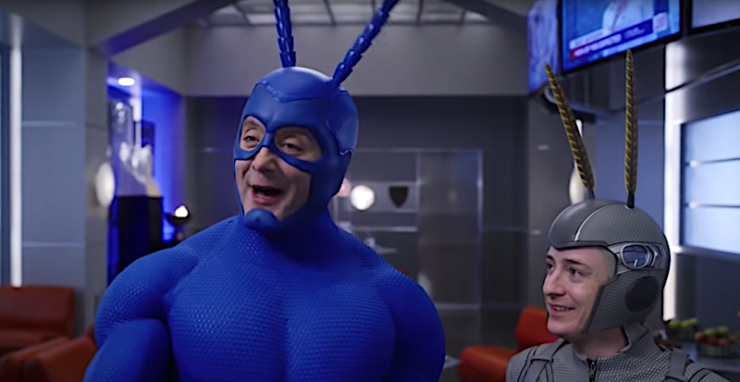First things first: The Tick Season 2 is even better than Season 1. Full of surprises, high wire puns, surprisingly effective action sequences, and a couple of different moments that made me tear up. All the acting is perfect. There is a person-sized Easter egg for longtime Tick fans. There are new heroes, new stirring Tick speeches, some excellent Walter moments. There are dance parties. While Arthur continues being the show’s main focus, this season gives us real narrative arcs for Dot and Overkill, and gives Dangerboat some time to shine.
But it’s more than that: With this season, The Tick takes its place next to the most morally important cultural commentaries that have been produced in the last three years.
The narrative of this season is, frankly, perfect. All the threads wind around each other in interesting ways. Each episode is strong on its own, but they all build into a fantastic arc that is actually a bit stronger and more emotionally resonant than the last. I also want to make it clear that I needed to pause each episode multiple times to laugh. This may somehow be the funniest iteration of The Tick yet, and I cannot be more clear on this: If I could, I would walk to each of your homes and sit with you and watch both seasons all over again personally.
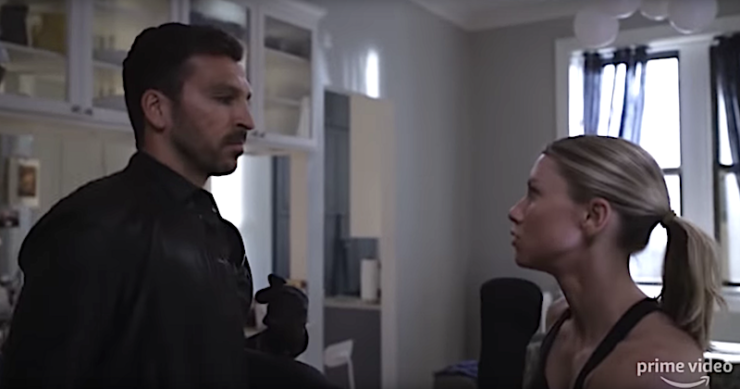
One of the things I love in ensemble shows is watching how different pairing work out—I didn’t expect Overkill and Dot to work last season, but the two had obvious chemistry which only gets better in these episodes. This season we get to watch Tinfoil Kevin and Dot bounce off each other, plus we get to see Tick and Arthur solidify their partnership as they meet new heroes including Sage (a magician with a… psychic third nipple?) Flexxon (super flexible, mostly retired, has a day gig as a lawyer) and BronzeStar (I have no idea what BronzeStar’s power is) as well as dealing with the return of Ms. Lint—in a slightly modified form.
From here on I’ll be dealing with the thematic aspects of this season, and we will be getting into spoilers, so beware going forward!
The Tick‘s second season uses each of its episodes to ask a simple question: Do you choose fear, or love? When faced with someone who might be a supervillain, or someone who has practiced supervillainy in the past, you can either be afraid of them and run away (if you’re Arthur) or fight them without getting too murdery (if you’re Tick) or just straight up kill ’em (if you’re Overkill). But there is another choice, the one where you do your best to approach them with empathy and see if you can stop them with love. Because sometimes if you do that, you’ll learn that they were never a villain at all. The show asks each of its characters to make this choice, but it also asks it of the audience. Are you willing to give Ms. Lint a second chance? Are you willing to look past Lobstercules’ chitinous shell? And of course the flipside is that sometimes the guys you think of as heroes, your Superians, your AEGIS agents, turn out to exist in a much more grey area than you might at first suspect.
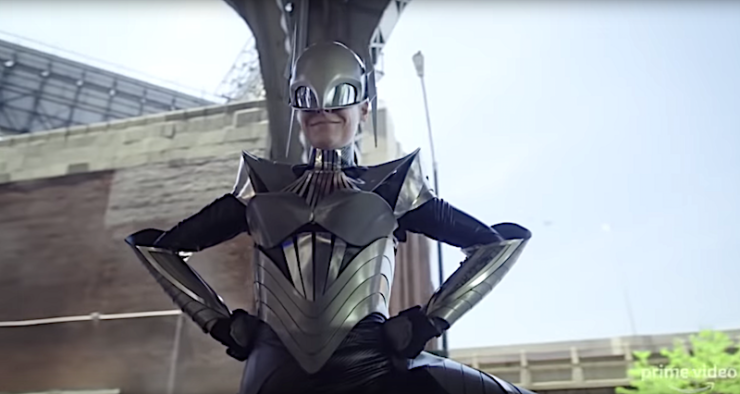
Once again the show asks the cast to toss the conceptual balloon “what does it mean to be a hero?” around the room, with some lovely results. Dot has decided that she needs to find her own mission, apart from just being Arthur’s protective older sister. Arthur isn’t always OK with that. Overkill has to reckon with an old mentor, and settle some debts he gained as a mercenary. Dangerboat has to sort out his feelings for Arthur. Ms. Lint (MVP as always) finds herself being tempted to the heroic side of the super-equation, and has to give serious thought to her love of villainy.
AEGIS is a fantastic parody of a certain government agency (think of them as a S.H.I.E.L.D. protecting you from supervillains) because the writers go all in on it being a government agency. Here are the terrible fluorescent-lit hallways, the endless lines to fill out necessary forms, the mysterious labs that you probably shouldn’t think about too much. But here, too, is the Hero’s Lounge, looking like a souped-up JetBlue terminal. Here’s the Ready Room for the famous Flag Five. The season very quickly, and with only a few sets, sketches in an entire history of superheroing, and you get a tactile sense of how the heroes have been folded into governmental bureaucracy and political machinations.
A few weeks ago, in an interview with video essayist/filmmaker Patrick Willems, Griffin Newman (Arthur) talked about how Season 2 of the Tick was largely about paperwork. And I shrieked with delight because I knew that a lot of people would probably assume that that was a joke, but I thought that meant we would be leaning into Arthur’s life as an accountant, which would make for a fantastic juxtaposition with superheroing. To an extent I was correct. But in another way, and I am ashamed to say this: I underestimated Ben Edlund, and I apologize.
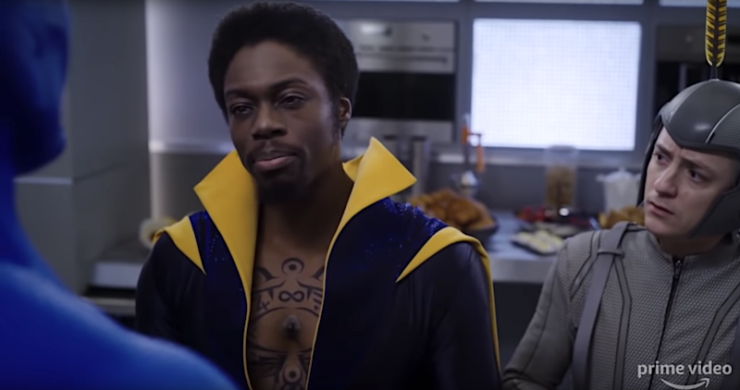
This is no mere gag about an accountant needing to help his befuddled Blue Friend work his way through all the forms and filing necessary to be an officially registered hero, no: This season is about the way bureaucracy erases humanity and destroys lives.
Two years ago I asked if we were ready for a post-Watchmen Tick, but now The Tick has become the most overtly political comic work since Watchmen. Wait, come back! The show never mentions a single political candidate, no one talks about Ulysses, and the words Republic and Democratic are never said, nor yet Libertarian, Socialist, or even Independent. Plus, in a vast improvement over Watchmen, The Tick continues its tradition of embracing life with optimism and humor rather than the nihilistic streak that runs through Alan Moore’s seminal work. But at its core, the show is taking that old question of what makes a person a superhero, and twists it into a far more complex question: Who counts as human?
After the events of last season, with the Terror revealed to be alive and The Tick turning up to patrol The City, heroes and villains of various stripes have begun coming out of the woodwork and with them, the organization known as AEGIS has reopened its City HQ to keep track of everyone. Naturally Arthur, a lifelong fan of the old superteam the Flag Five, wants to join up. He want to be properly registered and have a card and access to the Heroes Lounge. (They have incredible croissants.) Naturally the Tick is a bit more laissez faire about the whole thing. He’s a hero; if someone needs saving, he saves them and moves on to the next person. That’s his destiny. He goes along with Arthur to make him happy. But as we delve deeper into the operations at AEGIS, we learn that heroes aren’t just called heroes—they’re tagged with the much more sinister moniker “Categories.” They’re put into machines that will determine which exact category they are. And then, well, then we get into the darker truth that not everyone at AEGIS considers the categories human. Superian isn’t right? He’s an alien, with unclassifiable powers. Is the Tick human? Is Ms. Lint? Who gets to decide?
I ask because it might seem super keen to not be human, given how much of a mess most of us are most of the time, but if you’re not human, someone can lock you in a cage and take your babies away from you. If you’re not human, the news can vilify you and make you seem like a monster. If you’re not human, you can be studied and diced up in a lab, left in solitary, denied a lawyer, left to rot.
The show gives us two comically non-human characters in Danger Boat and Lobstercules, but in both cases, characters that could have been one-note jokes are revealed to be feeling, thinking people with tragic pasts. Then we learn that, according to Kevin, no Category is considered human. Tinfoil Kevin, the homeless guy we all laughed at at the beginning of Season One. And he’s right—plenty of people in AEGIS don’t see the Tick as human. They don’t see Overkill as human, or Flexxon, or BronzeStar.
Buy the Book
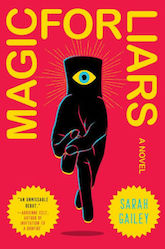

Magic for Liars
None of ‘em.
But, you might say, of course they’re human—they look human, and they speak and think!
Well, Dangerboat speaks. He loves and grieves his losses, and hopes for a better future. So does Lobstercules.
When we met Dangerboat he was a comic figure, a prissy Felix Ungar meant as a sci-fi counterpoint to Overkill’s Punisher riff. When we meet Lobstercules in this season, she’s a classic Tick villain—utterly ridiculous. What could be sillier than a giant lobster that uses its huge claws to rob banks? And yet in both cases we learn that Dangerboat had his own life and tragedies long before he met Overkill, and just as the mercenary holds himself responsible for the deaths of good soldiers in the field, so Dangerboat carries guilt with him to each new port. And Lobstercules? You were right, it is ridiculous that a giant lobster would rob banks with her claws. She’s a completely sentient, loving creature, a mom, and she’s only committing crimes because a gang is holding her babies hostage. She knows that if she tries to escape, her babies will be bisque, so she tries to make the best of a horrific situation.
So what does it mean that some characters are willing to end Dangerboat’s life as a sentient boat when he goes into an existential panic? What does it mean that Lobstercules’ babies are ripped out of her arms?
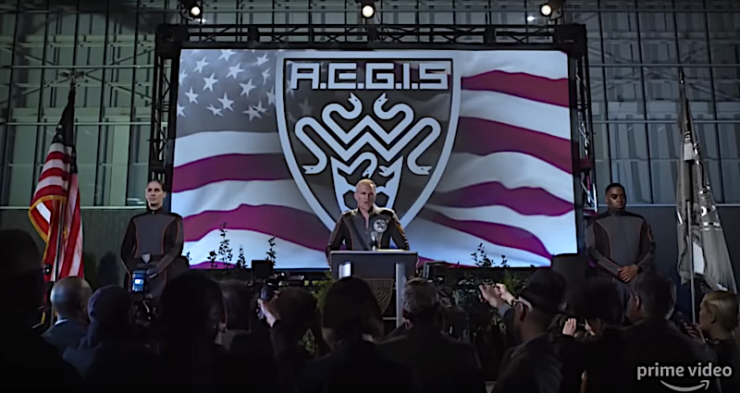
Since people look at Lobstercules and see a monster, no one cares about her struggles or pain. The idea that she might be a refugee never even occurs to them, and the head of AEGIS, Tyrannosaurus Rathbone, has to be begged to give her a chance to prove her sentience. She’s not given the benefit of the doubt. And when the subject of her babies does come up, Agent Doctor Hobbes immediately begins scheming about the experiments he could do on them, and Rathbone certainly doesn’t rush to Lobstercules’ aid. This stands in sharp contrast to Rathbone’s reaction later on when he learns that Arthur has been ignoring his mom’s phone calls—he is ordered to stop in the middle of an emergency mission and talk to her, because she’s his mother and she deserves respect. That mother, the mother Rathbone acknowledges as human, deserves respect.
By AEGIS standards, Arthur’s the only real human in the show. He’s also the one with the superpower that proves most vital: He’s the only one who shows genuine compassion. Tick is all puppy-like enthusiasm, but he’s also invulnerable and seemingly doesn’t feel personal fear, so doing the right thing isn’t quite the same level of choice for him. Dot decides Overkill’s mercenary ways are superior to Tick’s, and gives him the go-ahead to become a murderer again. The other heroes are just happy to hang out in the Hero’s Lounge, and they seem like great guys, but they also aren’t going out of their way to help people. Ms. Lint, for all of her flirtation with Good, plays a long con the entire time and genuinely doesn’t care what happens to anyone else. And Edgelord?
Edgelord doesn’t get involved—he walks between the raindrops.
In the end, for all that Tick gets the big heroic moment of asking everyone whether they’ll choose fear or love, it’s Arthur who actually makes the choice, repeatedly. Arthur is small, and even vulnerable in his super suit, but he’s the one who sees through danger and bluster to get to the heart of what it means to be a hero. In “Blood and Cake” Dangerboat relives an old trauma and initiates a self-destruct sequence—essentially attempting to reboot his emotional state. Overkill talks Dot through severing his nervous system, and everyone is on board with this plan, except Arthur, who gently talks Dangerboat through his grief and saves all of them. When most of humanity has turned on Superian, Arthur is the one human the alien feels he can trust to give him both empathy and straight answers. (This does not go as well as the Dangerboat situation.) Arthur listens to Lobstercules even though he thinks she’s a monster, and leads the fight to save her and reunite her with her children once he learns the truth. He puts her needs above his Hero’s Oath even though that scandalizes Tick, and cares for her babies despite the fact that they’re fugitives (adorable fugitives) and harboring them might kill his dream of joining the Flag Five. Arthur’s hero’s journey is still the main arc of the show, but this time it’s not about answering Destiny’s Call or learning how to fight in a training montage or wallowing in his own painful origin story—his superpower is being willing to listen, and empathize, and help people.
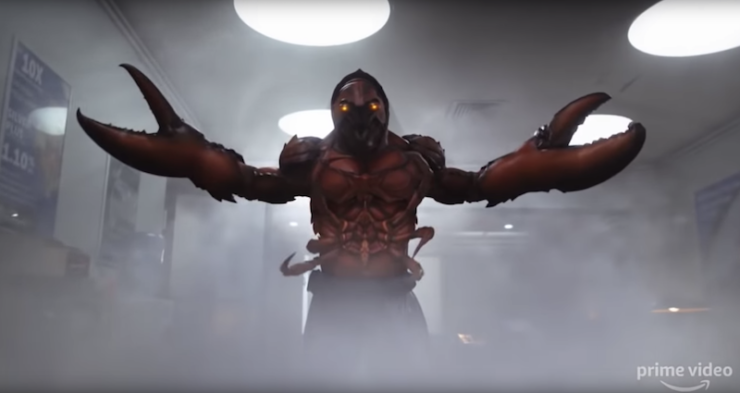
Or help, you know, giant lobsters.
Like I said, I underestimated Ben Edlund. I expected a fun season about Tick and Arthur out on patrol. What I got instead was a searching work about humanity and heroism, and how what makes people people can be eroded by a fanatical adherence to bureaucracy and order. What I got was Tick telling everyone that they had to choose between Fear and Love. What I got was Arthur praying to Superian, and, when he doesn’t get an answer, stepping up to be the hero his City needs. But I also got Edgelord, the funniest character EVER, and Lobstercules, the BEST character ever, and people discussing Sage’s psychic nipple, and Walter being awesome, and more of Arthur’s lovely mom, and an avalanche of puns that are making my heart sing every time I think of them, and, and…
All right, fine. I will come to each of your houses to watch it with you. Start looking up places to order tacos, people. I’ll be there in time for dinner.
Leah Schnelbach wants to hug Lobstercules, and is VERY HAPPY that she just got to type that. Choose Love with them over on Twitter!










